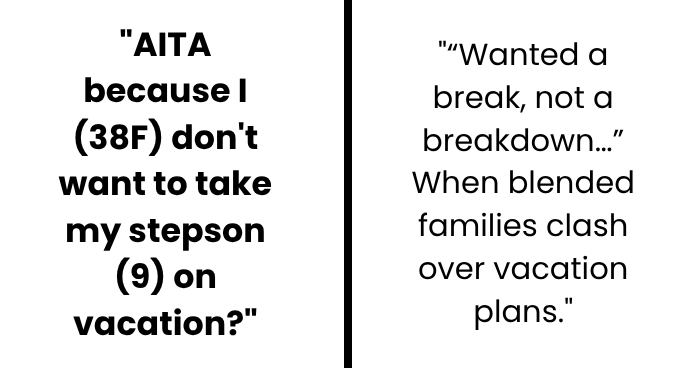“A Vacation Without My Stepson?” When Family Boundaries Clash With Parental Roles

This story dives into a deep emotional dilemma faced by a 38-year-old woman who asked Reddit’s AITA community if she was in the wrong for not wanting to bring her 9-year-old stepson on a vacation she was planning for her biological children. Married for five years to her husband (39), the OP (Original Poster) has a blended family that includes her two young daughters and her son (10) from a previous marriage. Her stepson, from her husband’s prior relationship, lives with them full-time since his biological mother is largely absent.
After receiving a work bonus, OP wanted to plan a vacation for what she referred to as “just my family,” meaning her own kids and not her stepson. She clarified that it wasn’t about disliking the boy—she sees him as a good kid—but simply wanted a break from a role she felt she never fully chose. Her husband initially agreed, but her mother’s reaction was harsh, accusing her of hypocrisy and being an AH for excluding a child who clearly needed family support.
What followed was a deeply introspective journey. After showing the thread to her husband, OP learned that he had long felt uncomfortable with how she treated his son. The community response, which was overwhelmingly critical, led OP to confront her own assumptions about step-parenting and commit to personal and family therapy. Her honest update marked a powerful turning point and a willingness to embrace change for the betterment of her blended family.
Let’s talk about it. This story hits hard because it touches on something so many families struggle with but rarely say out loud: What happens when you just don’t feel like a parent to your stepchild?
First off, let’s be real—being a stepparent is no easy ride. It’s complicated, often thankless, and comes with emotional landmines. If you’re googling things like “how to love your stepchild when it doesn’t feel natural,” you’re not alone. Stepparent burnout is a legit thing. According to the American Psychological Association, nearly 60% of second marriages that include children from previous relationships end in divorce, and the stress around child-rearing is one of the top reasons. And yeah, exclusion—whether intentional or not—can blow a hole in the foundation of a blended family.
1. The Emotional Load of Stepparenting
Blended families come with invisible expectations. You’re often expected to step in and love someone else’s child like your own without the emotional history that bonds biological parents to their kids. But guess what? That expectation is heavy. It’s also not entirely fair to assume emotional connection will happen overnight, or even in years. Love, especially parental love, doesn’t always show up on command.
But here’s where things get tricky: Kids don’t know (or care about) those inner struggles. They just feel when they’re not included.
The moment you draw a line between your kids and his kid, you’re not just expressing a preference—you’re creating a wall. That wall says, “You’re not really part of this,” even if that’s not what you meant. And for a child already dealing with abandonment from their bio parent? That wall hits like a wrecking ball.
2. Vacation = Symbolism in Family Dynamics
Let’s talk about why the vacation issue became such a flashpoint. Family vacations aren’t just about beaches and buffets. They’re bonding time. They’re a statement of who belongs. So when OP decided her stepson wouldn’t be part of that memory-making trip, it wasn’t just a logistical decision. It was symbolic.
Kids remember stuff like this. According to Dr. Laura Markham, author of Peaceful Parent, Happy Kids, “Exclusion from family events creates a deep wound in children that can carry into adulthood, especially if they already feel uncertain about their place in the family.”
That’s the emotional math: 1 excluded vacation = 10 years of therapy later.
3. Double Standards in Parental Inclusion
The mom in the story took her own biological son but wanted to exclude her stepson. That raised a lot of red flags, not just for Reddit, but for her own mom, too.
From a legal and ethical standpoint, if a child lives in your home full-time and your spouse has full custody, you are, for all intents and purposes, a parent. Maybe not by blood, but certainly by role.
And here’s the double standard: She justified taking her son because “he has no other parent,” but the stepson also doesn’t have another reliable parent. His bio mom checked out long ago. So in practice, he’s equally “parentless” from an emotional support standpoint. That’s why the argument fell flat.
Family courts don’t take kindly to this kind of inequality either. In several custody disputes, judges have weighed in on the emotional harm caused by “soft exclusion,” which includes leaving a child out of family events. It can influence custody modifications and even support arrangements.
4. Therapy Can Be a Game Changer (And Not Just for Kids)
A huge positive in this story? OP’s willingness to go to therapy. That’s honestly the best possible next step. Family therapy and even individual therapy can reframe your perspective and give you tools to connect authentically with a child you didn’t raise from day one.
Therapists who specialize in blended families often use techniques like genograms, role-playing, and empathy exercises to help stepparents understand their influence and the emotional landscape of stepchildren. It’s not magic, but it works over time.
And here’s the kicker—therapy isn’t just for “fixing” relationships. It’s for building new ones. Better ones. Ones where everyone feels seen.
5. The Long-Term Damage of Favoritism
Now let’s get into the parenting advice zone. If you’re in a blended family, playing favorites—even subtly—is one of the fastest ways to ruin sibling relationships. Kids notice everything. If one kid gets ice cream and another doesn’t, it’s World War III. Now imagine one gets Disneyland, and the other stays behind.
High-conflict co-parenting situations or parental absence are already hard on kids. Adding favoritism into the mix can lead to resentment, depression, and even estrangement. A 2023 Journal of Family Psychology study found that perceived parental favoritism in blended families increased sibling rivalry by over 40%—even in adulthood.
So while one vacation might feel like a small thing, it can snowball into years of tension.
some comments
This story isn’t just about a vacation. It’s about belonging. Identity. And what it means to truly accept a child that isn’t biologically yours but is 100% a part of your life.
The OP’s honesty—both in admitting her initial mindset and in being willing to change—deserves respect. Because parenting isn’t about perfection. It’s about showing up, being real, and learning when you screw up.
And let’s face it—blended families are hard. But they can also be beautiful. As long as everyone feels like they’re in it together.
Whether you’re a stepparent feeling overwhelmed or a bio parent navigating tricky dynamics, just remember: Love doesn’t have to be instant. But inclusion should be.





















